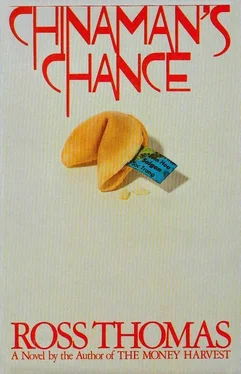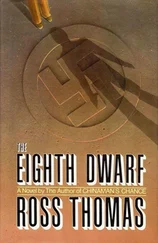“Has it got a name?”
“A working one, because not all of us are delighted with it. We’re tentatively calling it The Barbary Coast.”
“Okay, you’re offering four square blocks of broads, booze, gambling — sort of, anyway — food, a little action probably, maybe a three-way exhibition with a donkey or something like that; but it still doesn’t sound much better to me than Havana in the ’40s and ’50s. In fact, it sounds like a shuck.”
“It is a shuck, Mr. Overby. A safe, antiseptic, quite expensive, carefully immoral shuck that the average person will remember for the rest of his days because he will have convinced himself that he alone of all his fellow conventioneers actually experienced the real thing. The Japanese will go absolutely crackers over it.”
Overby nodded thoughtfully. “What it really is is sort of a dirty Disneyland, right?”
“Excellent, Mr. Overby, excellent. A dirty Disneyland for people with normally dirty, normally twisted minds. You see, in many cities they have set aside certain sections for legalized vice. Amsterdam comes to mind. The Reeperbahn in Hamburg. The Combat Zone in Boston, which was a recent, rather unsuccessful experiment that made the mistake of trying to offer the real thing. People don’t want the real thing, Mr. Overby, because the real thing has bad breath, and smelly armpits, and sometimes steals your wallet and makes you hurt when you pee. What people want is vice and sin that look the way that they look in the movies — and that’s exactly what we intend to give them. I would not be at all surprised if many a budding movie star will receive his or her first big break at The Barbary Coast.”
“How many people?”
“On the payroll?”
Overby nodded.
“Approximately five thousand, we believe, including the hotel staff, all organized by the same union whose pension fund, incidentally, is providing much of the capital.”
“The Teamsters?”
Simms only smiled.
“What will my million dollars buy me?”
“In.”
“How far in?”
“A cabaret perhaps. Half of a poker parlor even.”
“What would the return be?”
“Fifteen percent the first year. Between nineteen and twenty-one after that.”
“Guaranteed?”
“Not quite.”
“But you’ve worked these figures out pretty carefully?”
Simms made a gesture that indicated that they should resume their chairs before the fire. As they sat down, Simms said, “This is not someone’s sudden bright idea. It’s been on the boards for almost ten years. Teams of psychologists, cost accountants, designers — some of them from Disneyland, by the way — gaming experts, crowd-flow specialists, and even one rather well-known writer with a particularly salacious imagination have all been working on it for nearly a decade. We had to find the right town in just exactly the right stage of development — or perhaps I should say decline. Pelican Bay is ideal.”
“What about the Feds?”
“What about them?”
“Aren’t they interested?”
“No reason why they should be as long as the proper taxes are paid. We are not involved in interstate commerce; our business will cross no state lines.”
“When do you start operations?”
“The groundbreaking on the hotel will begin in approximately six months. Construction of The Barbary Coast — do you like the name?”
“Not much.”
“Well, it will begin at about the same time.”
“When would I have to say yes or no?”
“I’ll give you some figures to look over — some projections. Then you will have one month.”
“That’s not much time.”
Simms rose, signaling an end to the interview. “No, it isn’t. But there are many applicants who want to get in on what will be a very profitable ground floor. We have to decide which ones to select.”
Overby was also up now and noticed that he was being very politely steered toward the door. “I should add, I suppose, Mr. Overby, that this is only a pilot project. A billion-dollar pilot project.”
“You mean there’re going to be more of them?”
Simms smiled agreeably. “All over,” he said. “All over these United States — wherever we can find a suitable city. And I must say, there are additional candidates every day.”
“But you’re starting here?”
“In Southern California, you mean?”
Overby nodded.
“Doesn’t everything start here?” Simms said.
Otherguy Overby had drawn a rough map of Pelican Bay’s downtown section, which he had used to show Wu and Durant where the enormous hotel and what he called “the dirty Disneyland” would be erected.
“And all this goes, too,” Overby said, indicating another large chunk of Pelican Bay’s blighted commercial district. “They’re gonna turn practically the whole fucking downtown into one big parking lot. But that’s not all.”
“What else?” Durant said.
“Jobs. How many working stiffs would you say there are in Pelican Bay?”
Wu thought about it. “Maybe fifty or sixty thousand.”
“And suppose you created maybe five thousand new jobs with the absolute power to hire and fire. Translate them into votes and political clout and it means somebody’s gonna have Pelican Bay in their hip pocket.”
“The Ploughman Machine,” Durant said softly, and smiled to himself.
“The what?”
“Just somebody’s dream,” Durant said.
Overby tossed aside the pencil he had been using as a pointer for the rough map he had drawn and leaned back on the couch. Since his return to his apartment it had taken nearly an hour for him to describe the meeting with Simms. It had taken that long because he had left nothing out and he had quoted Simms verbatim most of the time, even down to Simms’s shrugs and steepled fingers and half-whimsical smiles.
“So,” Durant said, still looking at the map on the coffee table, “what it adds up to is a billion-dollar pilot project for sanitized licentiousness.” He looked at Wu and frowned slightly. “What the hell’s wrong with that?”
“Not enough,” Artie Wu said.
Durant nodded slowly. “Not nearly enough.”
While Otherguy Overby was describing the curious fate that awaited Pelican Bay, fifty-one-year-old Herb Conroy, the reporter who would be lunching at the Woodbury Club that afternoon, was throwing up his breakfast into the kitchen sink under the watchful, sympathetic gaze of his sixty-three-year-old mother-in-law, Netta Gambling, who over the years had by default become Conroy’s favorite drinking buddy.
Conroy’s breakfast that morning had consisted of a large, warm glass of Manischewitz Concord-grape wine, which was about the only thing that would stay down long enough to soothe the uncontrollable shakes that Conroy woke up to nearly every morning.
“You don’t look so good, Herb,” Netta Gambling said, and took another swallow of her breakfast beer, her second can of the morning.
Conroy turned from the sink. Tears caused by the vomiting streamed down his puffy cheeks. He wiped them away with a hand that shook. “How bad?”
Netta studied him judiciously. “Well, not as bad as last Saturday. Last Saturday was kinda bad, if you remember.”
Conroy took a deep breath. He was a thin man, medium tall, who would have been wiry except that he long ago had lost all muscle tone. His face was pasty and splotched with gray, except for the tip of his nose and two round spots high up on his cheekbones where years before the capillaries had burst into rosy bloom. The shape of his nose was ordinary, and his mouth was gray and almost thin, and his chin was virtually without character of any kind.
“Well,” Netta said, “this is gonna be your big day, huh? You took the day off from work and everything.”
Читать дальше












